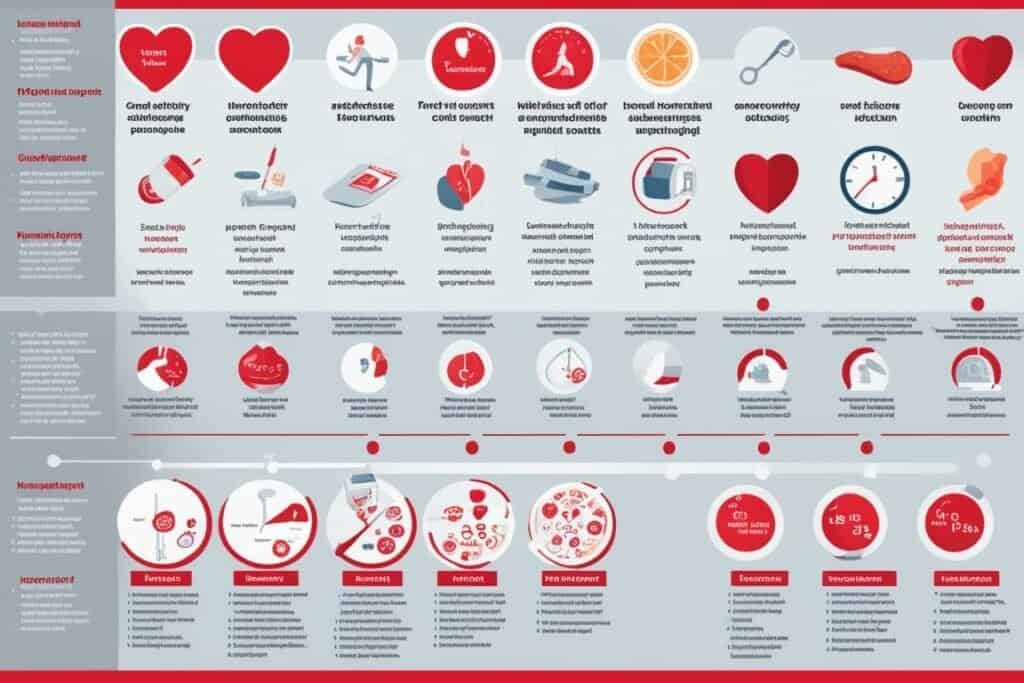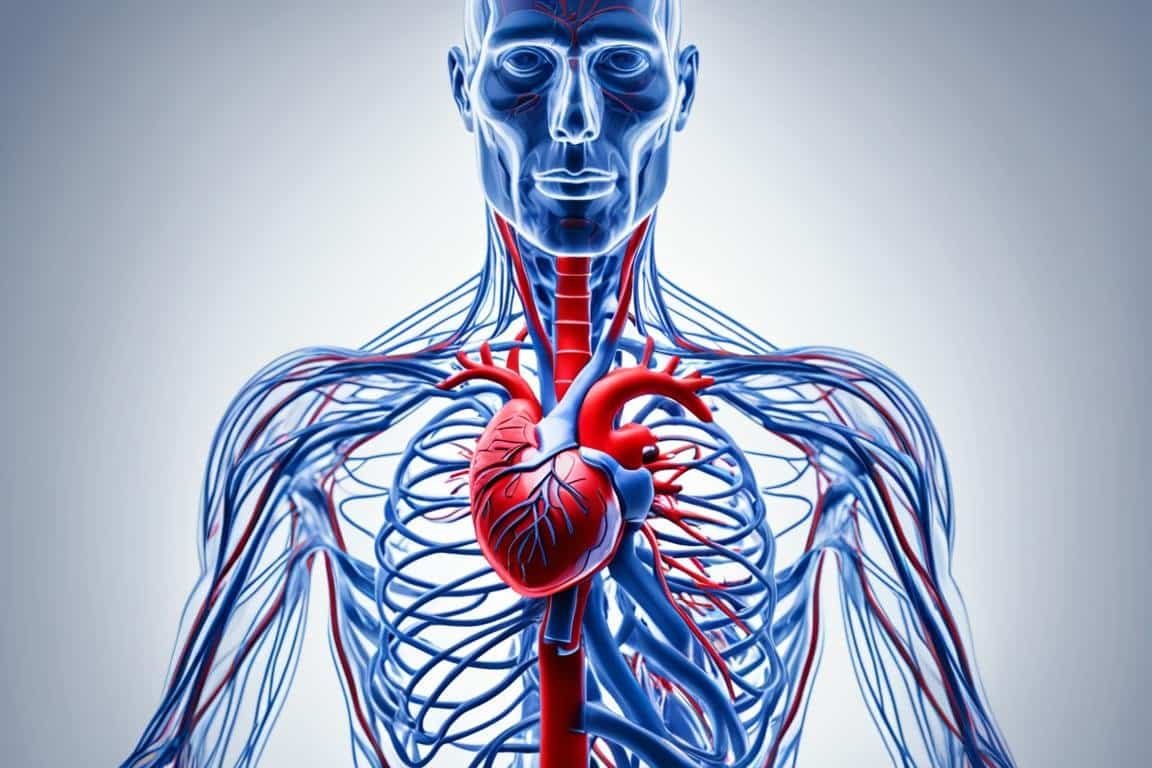A heart attack, also known as a myocardial infarction, can have lasting consequences on your body. When a part of the heart muscle doesn’t receive enough blood due to a blockage in the coronary arteries, damage occurs to the heart muscle. The main cause of heart attacks is coronary artery disease (CAD), but severe coronary artery spasms can also lead to a heart attack. Prompt treatment is crucial to reduce damage and improve long-term outcomes.
Key Takeaways:
- Heart attack, or myocardial infarction, occurs when the heart muscle doesn’t receive enough blood due to a blockage in the coronary arteries.
- Prompt treatment is crucial to reduce damage and improve long-term outcomes.
- Coronary artery disease (CAD) is the main cause of heart attacks.
- Recognizing heart attack symptoms, such as chest pain and shortness of breath, is important for seeking immediate medical help.
- Understanding the risk factors, such as high blood pressure and smoking, can help prevent heart attacks.
Significance of Recognizing Heart Attack Symptoms
Recognizing the symptoms of a heart attack is crucial for your health and well-being. Understanding these symptoms can help you seek timely medical help, potentially saving your life. Here are the common symptoms to watch out for:
- Chest pain or discomfort: This is one of the most common signs of a heart attack. The pain may be felt in the center or left side of the chest and can be described as pressure, squeezing, fullness, or pain.
- Shortness of breath: Feeling breathless or having difficulty breathing can also be an indication of a heart attack. If you experience sudden unexplained shortness of breath, it’s essential to take it seriously and seek medical attention.
- Jaw, neck, back, arm, or shoulder pain: Pain or discomfort in these areas, especially when combined with other symptoms, could be a sign of a heart attack. Pay attention to any unusual pain or discomfort that radiates from the chest to these regions.
- Nausea, vomiting, or unusual tiredness: Some individuals may experience symptoms like nausea, vomiting, or extreme tiredness during a heart attack. These symptoms, along with others, should not be ignored.
It’s important to note that women may experience atypical symptoms during a heart attack. These can include pain in the neck, arm, or back, instead of the more typical chest pain. Therefore, it is crucial to be aware of these variations among different individuals.
By being aware of the potential symptoms of a heart attack, you can take prompt action and seek medical assistance. Remember, every minute counts when it comes to a heart attack. Don’t hesitate to call emergency services or visit the nearest hospital if you suspect a heart attack.
Risk Factors for Heart Attack
Several factors can increase your risk of experiencing a heart attack. By understanding these risk factors and making necessary lifestyle changes, you can reduce the chances of a heart attack and the long-term complications associated with it.
- Coronary Artery Disease (CAD): The most common cause of heart attacks is CAD, a condition in which the coronary arteries become narrowed or blocked, restricting blood flow to the heart.
- High Blood Pressure: Having high blood pressure puts extra strain on your heart and increases the risk of a heart attack.
- High Blood Cholesterol: Elevated levels of cholesterol in your blood can lead to the formation of plaque in the arteries, increasing the risk of a heart attack.
- Smoking: Smoking damages the blood vessels, reduces oxygen supply to the heart, and increases the risk of blood clot formation, all of which contribute to heart attacks.
- Age: Men over the age of 45 and women over the age of 55 are at higher risk of heart attacks.
- Family History of Heart Disease: If you have a family history of heart disease, your risk of a heart attack is increased.
- Diabetes: Individuals with diabetes are more prone to developing heart disease, including heart attacks.
- Obesity: Being overweight or obese puts additional stress on your heart and increases the risk of a heart attack.
- Physical Inactivity: Lack of regular physical activity can weaken the heart muscle and contribute to the development of heart disease.
- Stress: High levels of stress can trigger heart attacks and worsen existing heart conditions. Finding healthy ways to manage stress is crucial for heart health.
Adopting a healthy lifestyle can play a significant role in reducing your heart attack risk. Make sure to maintain a heart-healthy diet, engage in regular exercise, quit smoking, manage stress effectively, and control other risk factors, such as high blood pressure and high blood cholesterol levels. By taking proactive steps, you can protect your heart and improve your long-term health.

Long-Term Effects and Complications of a Heart Attack
A heart attack can have significant long-term effects and complications on the body. It is important to understand these potential consequences in order to take necessary steps for a healthier future.
One of the possible long-term effects of a heart attack is heart failure. This occurs when the heart is unable to pump blood adequately, leading to symptoms such as shortness of breath, fatigue, and fluid retention.
Another complication that can develop following a heart attack is arrhythmias, which are irregular heart rhythms. These irregularities can disrupt the normal functioning of the heart’s electrical system, potentially leading to cardiac arrest.
Furthermore, a heart attack increases the risk of stroke and peripheral artery disease. Both conditions can have serious implications for overall health and wellbeing.
In addition to physical complications, individuals who have experienced a heart attack may also face emotional challenges. Chronic pain, depression, and anxiety are common among heart attack survivors.
It is crucial for individuals to make post-heart attack lifestyle changes to mitigate these long-term effects and improve overall well-being. This includes adhering to medications, adopting a heart-healthy diet, engaging in regular exercise, and effectively managing stress.
By making these changes, individuals can minimize the long-term complications of a heart attack and live a healthier, fulfilling life.
| Complication or Long-Term Effect | Description |
|---|---|
| Heart Failure | Inability of the heart to adequately pump blood, leading to symptoms such as shortness of breath and fatigue. |
| Arrhythmias | Irregular heart rhythms that can disrupt the normal functioning of the heart’s electrical system. |
| Cardiac Arrest | A sudden disruption of the heart’s electrical system, leading to a loss of heart function. |
| Stroke | A medical condition caused by interrupted blood flow to the brain. |
| Peripheral Artery Disease | A condition where there is a narrowing of the blood vessels outside the heart, reducing blood flow to the limbs and organs. |
| Chronic Pain | Persistent pain that can affect various parts of the body, potentially impacting daily activities. |
| Depression | A mood disorder characterized by persistent sadness and loss of interest in activities. |
| Anxiety | A mental health condition characterized by excessive worry and fear. |
Recovery Process and Rehabilitation After a Heart Attack
After a heart attack, your recovery involves both physical and emotional healing. The journey to regain your health begins with cardiac rehabilitation, a supervised program that focuses on various aspects of recovery. This program includes physical activity, education on healthy living, counseling, and support.
Physical Activity: Engaging in regular physical activity is an essential component of your recovery process. Under the guidance of healthcare professionals, you’ll participate in exercises that gradually increase your endurance and strength. This helps restore your heart’s functionality and improves overall cardiovascular health.
Healthy Lifestyle Changes: Adopting a heart-healthy lifestyle is crucial for your long-term well-being. This involves making changes to your diet, quitting smoking, and effectively managing stress. Consuming a nutritious, heart-healthy diet that includes fruits, vegetables, whole grains, lean proteins, and healthy fats can support your recovery and reduce the risk of future complications.
Medication Adherence: It is essential to adhere to the prescribed medications as part of your recovery process. These medications help manage your condition, control risk factors, and prevent future heart problems. By taking your medications as directed and attending follow-up appointments with your healthcare team, you can optimize your recovery and reduce the chances of recurring issues.
Stress Management: Managing stress is crucial for your heart health and overall well-being. Participating in stress management techniques like meditation, deep breathing exercises, and engaging in hobbies or activities you enjoy can help you cope with stress effectively and promote a healthier recovery.
Heart-Healthy Diet: Along with physical activity, adopting a heart-healthy diet plays a key role in your recovery. Focus on consuming nutrient-rich foods that are low in saturated fats, cholesterol, and sodium. This includes incorporating plenty of fruits, vegetables, whole grains, lean proteins, and healthy fats into your daily meals.

Your commitment to the recovery process, including participating in cardiac rehabilitation, making necessary lifestyle changes, and adhering to prescribed medications, will greatly enhance your long-term heart health. The cardiac rehabilitation program provides you with essential tools and support, empowering you to make these positive changes and optimize your well-being.
Prevention Strategies for Long-Term Heart Health
Preventing future heart attacks and maintaining long-term heart health requires adopting healthy lifestyle choices. By making these preventive strategies a part of your daily life, you can reduce the risk of future heart attacks and improve your overall well-being.
Exercise Regularly
Engaging in regular exercise, such as walking or other forms of physical activity, can strengthen your cardiovascular system. Aim for at least 150 minutes of moderate-intensity aerobic activity or 75 minutes of vigorous-intensity aerobic activity per week. Additionally, incorporate strength training exercises into your routine to build muscle and improve overall heart health.
Adopt a Balanced Diet
A balanced diet plays a crucial role in maintaining heart health. Include plenty of fruits, vegetables, whole grains, lean proteins, and healthy fats in your meals. Limit the intake of saturated and trans fats, sodium, and added sugars. Opt for cooking methods like baking, grilling, or steaming instead of frying. Pay attention to portion sizes to maintain a healthy weight and support optimal heart function.
Quit Smoking
Smoking is a major risk factor for heart disease and can greatly increase the likelihood of another heart attack. Quitting smoking is one of the most effective ways to protect your heart. Seek support from healthcare professionals or quit-smoking programs to increase your chances of success. Remember, it’s never too late to quit and enjoy the benefits of a smoke-free life.
Manage Stress
Long-term stress can negatively impact your heart health. Find healthy ways to manage stress, such as practicing relaxation techniques (deep breathing, meditation, yoga), engaging in hobbies or activities you enjoy, spending time with loved ones, and getting enough sleep. Prioritize self-care and make time for activities that promote relaxation and rejuvenation.
Regular Check-ups
Regular check-ups with healthcare professionals are essential for monitoring your heart health. These check-ups can help detect any potential issues early on and allow for prompt intervention. Stay on top of routine screenings, such as blood pressure and cholesterol checks, and discuss any concerns or symptoms with your doctor.
| Prevention Strategies | Action Steps |
|---|---|
| Exercise Regularly | Engage in at least 150 minutes of moderate-intensity aerobic activity or 75 minutes of vigorous-intensity aerobic activity per week. Incorporate strength training exercises into your routine. |
| Adopt a Balanced Diet | Incorporate plenty of fruits, vegetables, whole grains, lean proteins, and healthy fats into your meals. Limit saturated and trans fats, sodium, and added sugars. Choose healthier cooking methods. |
| Quit Smoking | Seek support from healthcare professionals or quit-smoking programs to quit smoking. Enjoy the benefits of a smoke-free life. |
| Manage Stress | Practice relaxation techniques, engage in hobbies, spend time with loved ones, and prioritize self-care to manage stress effectively. |
| Regular Check-ups | Attend regular check-ups with healthcare professionals to monitor your heart health and detect potential issues early on. |
Conclusion
Experiencing a heart attack can have long-term consequences on your body. It is important to understand the significance of recognizing symptoms, knowing the risk factors, and being aware of potential complications. By actively engaging in the recovery process, participating in cardiac rehabilitation, making necessary lifestyle changes, and diligently adhering to prescribed medications, you can significantly improve your long-term outcomes.
Taking preventive measures is crucial for maintaining your heart health. By adopting a healthy lifestyle, including regular exercise and a balanced diet, quitting smoking, managing stress, and seeking regular medical check-ups, you can reduce the risk of future heart attacks and enhance your overall well-being. Remember, prioritizing your heart health is essential for maintaining a good quality of life and preventing further complications.
Take control of your heart health today and implement the necessary prevention strategies to keep your heart strong and healthy. By doing so, you can minimize the impact of a heart attack, support your long-term recovery, and ensure a healthier future. Your heart is precious, so make it a priority and invest in your well-being.

